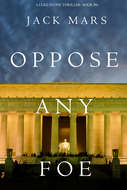Czytaj książkę: «Situation Room»
Jack Mars
Jack Mars is author of the bestselling LUKE STONE thriller series, which include the suspense thrillers ANY MEANS NECESSARY (book #1), OATH OF OFFICE (book #2) and SITUATION ROOM (book #3).
Jack loves to hear from you, so please feel free to visit www.Jackmarsauthor.comwww.Jackmarsauthor.com to join the email list, receive a free book, receive free giveaways, connect on Facebook and Twitter, and stay in touch!
Copyright © 2016 by Jack Mars. All rights reserved. Except as permitted under the U.S. Copyright Act of 1976, no part of this publication may be reproduced, distributed or transmitted in any form or by any means, or stored in a database or retrieval system, without the prior permission of the author. This ebook is licensed for your personal enjoyment only. This ebook may not be re-sold or given away to other people. If you would like to share this book with another person, please purchase an additional copy for each recipient. If you’re reading this book and did not purchase it, or it was not purchased for your use only, then please return it and purchase your own copy. Thank you for respecting the hard work of this author. This is a work of fiction. Names, characters, businesses, organizations, places, events, and incidents either are the product of the author’s imagination or are used fictionally. Any resemblance to actual persons, living or dead, is entirely coincidental. Jacket image Copyright STILLFX, used under license from Shutterstock.com.
BOOKS BY JACK MARS
LUKE STONE THRILLER SERIES
ANY MEANS NECESSARY (Book #1)
OATH OF OFFICE (Book #2)
SITUATION ROOM (Book #3)

Listen to the LUKE STONE THRILLER series in audio book format!
CHAPTER ONE
August 15th
7:07 a.m.
Black Rock Dam, Great Smoky Mountains, North Carolina
The dam sat there, immutable, gigantic, the one constant in Wes Yardley’s life. The others who worked there called it “Mother.” Built to generate hydroelectric power in 1943 during the height of World War Two, the dam was as tall as a fifty-story building. The power station that operated the dam was six stories high, and Mother loomed behind it like a fortress from some medieval nightmare.
Wes started his shift in the control room the same way he had for the last thirty-three years: he sat at the long half-circle desk, plunked his coffee mug down, and logged into the computer in front of him. He did this automatically, without thinking, still half-asleep. He was the only person in the control room, a place so antiquated it resembled a set from the old TV show Space 1999. It had last been remodeled sometime in the 1960s, and it was a 1960s version of what the future might look like. The walls were covered with dials and switches, many of which hadn’t been touched in years. There were thick video screens which no one ever turned on. There were no windows at all.
Early morning was normally Wes’s favorite part of the day. He had some time to himself to sip his coffee, go over the log from the night before, check the electricity generation figures, and then read the newspaper. Often enough, he would pour himself a second cup of coffee about halfway through the sports pages. He had no reason to do otherwise; after all, nothing ever happened here.
In the past couple of years, he had taken to reading the want ads as part of his morning ritual. For seventeen years, since computers had come in and the control room had gone automated, the big brains at the Tennessee Valley Authority had talked about controlling this dam from a remote location. Nothing had come of it so far, and maybe nothing ever would. Nothing had come of Wes’s want ad perusals, either. This was a good job. He’d be happy to go out of here on a slab one day, hopefully in the distant future. He absently reached for his coffee mug as he leafed through last night’s reports.
Then he looked up – and everything changed.
Along the wall across from him, six red lights were blinking. It had been so long since they blinked, it took him a full minute to remember what those lights even meant. Each light was an indicator for one of the floodgates. Eleven years ago, during a week of torrential rains up north, they had opened one of the floodgates for the better part of three hours each day so the water up top didn’t breach the walls. One of those lights blinked the entire time the gate was open.
But six lights blinking? All at the same time? That could only mean…
Wes squinted at the lights, as if that might help him see them better. “What the..?” he said in a quiet voice.
He picked up the phone on the desk and dialed three digits.
“Wes,” a sleepy voice said. “How’s your day going? Catch the Braves game last night?”
“Vince?” Wes said, ignoring the man’s banter. “I’m down in the box, and I’m looking at the big board. I’ve got lights telling me that Floodgates One through Six are all open. I mean, right now, all six gates. It’s an equipment malfunction, right? Some kind of gauge error, or a computer glitch. Right?”
“The floodgates are open?” Vince said. “That can’t be. Nobody told me anything.”
Wes stood and drifted slowly toward the board. The phone cord trailed behind him. He stared at the lights in awe. There was no readout. There was no data to explain anything. There was no view of anything. It was just those lights, blinking out of unison, some fast, some slow, like a Christmas tree gone a little bit insane.
“Well, that’s what I’m looking at. Six lights, all at once. Tell me that we don’t have six floodgates open, Vince.”
Wes realized he didn’t need Vince to tell him. Vince was in the middle of speaking, but Wes wasn’t listening. He put the phone down and moved along a short narrow hallway to the observation room. It felt as if his feet were not attached to his body.
In the observation room, the entire south wall was rounded, reinforced glass. Normally, it looked out on a view of calm stream, flowing away from the building, turning right a few hundred yards away, and disappearing into the woods.
Not today.
Now, before him, was a raging torrent.
Wes stood there, mouth agape, frozen, numb, a cold tingle spreading across his arms. It was impossible to see what was happening. The foam sprayed a hundred feet into the air. Wes couldn’t see the woods at all. He could hear a sound through the thick glass, too. It was the roar of water – more water than he could possibly imagine.
Ten million gallons of water per minute.
The sound, more than anything, made his heart thump in his chest.
Wes ran back to the telephone. He heard his own voice on the phone, breathless.
“Vince, listen to me. The gates are open! All of them! We’ve got a wall of water thirty feet high and two hundred feet wide coming through there! I can’t see what the hell is going on. I don’t know how it happened, but we need to shut it down again. NOW! You know the sequence?”
Vince sounded eerily calm; but then again, he hadn’t seen all that water.
“I’ll get my book out,” he said.
Wes went to the control panel with the phone wedged in his ear.
“Come on, Vince. Come on!”
“Okay, I got it,” Vince said.
Vince gave him a six-digit sequence of numbers, which Wes punched into the keypad.
He looked at the lights, expecting them to be off; but they were still blinking.
“No good. You got any other numbers?”
“Those are the numbers. Did you punch them in right?”
“I punched them in just like you said them.” Wes’s hands started to shake. Even so, he was starting to feel calm himself. In fact, more than calm. He felt removed from all this. He had once been in a car crash at night on a snowy mountain road, and as the car spun around and around, banging off the guardrails, Wes had felt a lot like he did at this moment. He felt asleep, like he was dreaming.
He had no idea how long those floodgates had been open, but six gates at once was a lot of water to release. Way too much water. That much water would overrun the river’s banks. It would cause massive flooding downriver. Wes thought of that giant lake above their heads.
Then he thought of something else, something he didn’t want to think of.
“Press cancel and we’ll start over,” Vince said.
“Vince, we got the resort three miles downstream from here. It’s August, Vince. You know what I’m saying? It’s the busy season, and they have no idea what’s coming their way. We need to get these gates shut right this second, or we need to call somebody down there. They have to get their people out.”
“Press cancel and we’ll start over,” Vince said again.
“Vince!”
“Wes, did you hear what I just said? We’ll get the gates shut. If not, I’ll call the resort in two minutes. Now press cancel and let’s start over.”
Dutifully, Wes did as he was told, fearing deep down that it would never work.
*
The telephone at the front desk rang incessantly.
Montgomery Jones sat in the cafeteria at the Black Rock Resort, trying to enjoy his breakfast. It was the same breakfast they served every day – scrambled eggs, sausages, pancakes, waffles – anything you wanted. But today, because the place was so busy, he was sitting in a corner of the cafeteria closest to the lobby. There were a hundred early-risers in here, taking up all the tables, gumming up the works at all the food stations. And that phone was starting to ruin Monty’s morning.
He turned and glanced into the lobby. It was a rustic place, with wood paneling, a stone fireplace, and a battered front desk that hundreds of people had carved into over the long years. The desk was a mad intaglio of initials with hearts drawn around them, long-forgotten well wishes, and half-hearted attempts at line drawings.
No one was at the desk to answer the phone, and whoever was on the other end of the line was not getting the memo. Every time the phone stopped ringing, it paused just a few seconds, then started right up again. To Monty, this meant that every time the caller reached voice mail, he or she hung up and tried again. It was annoying. Someone must be desperate to make last-minute reservations.
“Call back, you idiot.”
Monty was sixty-nine years old, and he’d been coming to Black Rock for at least twenty years, often two or three times a year. He loved it here. What he loved most of all was to get up early, have a nice hot breakfast, and get out on the scenic mountain roads on his Harley Davidson. He had his girlfriend Lena with him on this visit. She was almost thirty years his junior, but she was still up in the room. She was a late sleeper, that Lena. Which meant they would get a late start today. That was okay. Lena was worth it. Lena was proof that success had its rewards. He imagined her in the bed, her long brunette hair spread out across the pillows.
The phone stopped ringing. Five seconds passed before it started again.
All right. That’s enough. Monty would answer the damn phone. He stood and creaked on stiff legs over to the desk. He hesitated just for a second before picking it up. The index finger of his right hand traced the carving of a heart with an arrow through the middle. Yes, he came here a lot. But he wasn’t so familiar with the place that it was like he worked here. It wasn’t like he could take a reservation, or even a message. So he would just tell the caller to try back later.
He picked up the receiver. “Hello?”
“This is Vincent Moore of the Tennessee Valley Authority. I’m at the control station of the Black Rock Dam, three miles north of you. This is an emergency. We have a problem with the floodgates, and request an immediate evacuation of your resort. Repeat, an immediate evacuation. There’s a flood coming your way.”
“What?” Monty said. Somebody must be putting him on. “I don’t understand you.”
Just then, a commotion started in the cafeteria. A strange hubbub of voices began, rising in pitch. Suddenly a woman screamed.
The man on the phone started again. “This is Vincent Moore of the Tennessee Valley…”
Someone else screamed, a male voice.
Monty held the phone to his ear but he was no longer listening. Just through the doorway, people in the cafeteria were getting up from their seats. Some were moving toward the doors. Then, in an instant, panic set in.
People were running, pushing, falling over each other. Monty watched it happen. A surge of people came toward him, eyes wide, mouths open in round O’s of terror.
As Monty watched through the window, a wall of water three or four feet high swept over the grounds. A maintenance man in a golf cart driving by up a small hill from the main house was caught in the tide. The cart upended, flipping the man into the water and landing on top of him. The cart got caught for a moment, then slid down the hill on its side, pushed by all the water and gathering speed.
It slid right toward the windows, moving impossibly fast.
CRASH!
The cart slammed sideways into the window, shattering it – and a torrent of water followed.
It poured into the cafeteria through the smashed window. The golf cart came through the window, then slid across the room. A man tried to stop it, fell down in three feet of water, and didn’t come back up again.
Everywhere, people were falling down into the rising water, unable to stand up again. Tables and chairs were sliding across the room and piling up against the far wall.
Monty got behind the desk. He looked down at his feet. The water was already up to his calves. Suddenly, across the way, the entire thirty-foot window of the cafeteria caved in, spraying great shards of glass.
It sounded like an explosion.
Monty prepared to run. But before his feet could take hold, before he could even scramble over the desk, all he could do was raise his arms and scream as the wall of water consumed him.
CHAPTER TWO
7:35 a.m.
United States Naval Observatory – Washington, DC
To Susan Hopkins, first female President of the United States, life couldn’t be better. It was summer, so Michaela and Lauren were out of school. Pierre had brought them here once things had settled down, and finally, the whole family was staying here in the New White House. Michaela had bounced back from her kidnapping as if it had been a madcap adventure she chose to go on. She had even done a round of talk shows about her experience, and co-authored an article for a national magazine with Lauren.
Indeed, Susan and Pierre found themselves bending over backward so that Lauren didn’t feel left out of the publicity. After the first TV interview, they insisted that the girls do the shows together. It was only right – while Michaela was trapped on top of a fifty-story tower guarded by terrorists, Lauren was home alone, her twin sister and lifelong companion ripped away from her.
Sometimes, Susan found her breath taken away at the thought of losing her daughter. She woke in the middle of the night from time to time, gasping for air, like a demon was sitting on her chest.
She had Luke Stone to thank for Michaela’s return. Luke Stone had brought her back. He and his team had killed every single one of the kidnappers. He was a hard man to reconcile. Ruthless killer on the one hand, loving father on the other. Susan was convinced he had gone to that rooftop not because it was his job, but because he loved his own son so much he couldn’t bear the thought of Susan losing her daughter.
In ten days, the whole family, minus Susan, would be heading back to California to get ready for the school year. She would lose them again, but it was only a temporary loss, and it had been great having them here. So great that she was almost afraid to ponder it.
“What are you thinking about?” Pierre said.
They were lying on the king-sized bed in the master bedroom. Morning light streamed in through the southeast-facing windows. Susan lay with her head resting on his bare chest and her arm around his waist. So what if he was gay? He was her husband, and the father of her two daughters. She loved him. They had shared so much together. And this, Sunday morning, was their quiet time.
The girls, being tweens, were moving into their sleeping late years. They would stay in bed until noon if Pierre and Susan let them. Heck, Susan might stay in bed too, if duty didn’t call. President of the United States was a seven-day-a-week job, with a few hours of laziness on Sunday mornings.
“I’m thinking that I’m happy,” she said. “For the first time since June sixth, I’m happy. It’s been amazing having you guys here. Just like old times. And I feel like, with everything that’s happened, I’m finally getting a handle on this President thing. I didn’t think I would be able to, but I have.”
“You’ve gotten tougher,” Pierre said. “Meaner.”
“Is it bad?” she said.
He shook his head. “No, not bad at all. You’ve matured a lot. You were still very much a girl when you were Vice President.”
Susan nodded at the truth of that. “I was pretty girly.”
“Sure,” he said. “Remember how Mademoiselle had you out jogging in bright orange yoga pants? Very sexy. But you were Vice President of the United States at the time. It seemed a little… informal, shall we say?”
“It was fun being Vice President. I really loved it.”
He nodded and laughed. “I know. I saw.”
“But then things changed.”
“Yes.”
“And we can’t go back,” she said.
He looked down at her. “Would you want to, if you could?”
She thought about it, but only for a second. “If all those people could still be alive, the ones who lost their lives at Mount Weather, I would give this job back to Thomas Hayes in a heartbeat. But failing that, no. I wouldn’t go back. I’ve got a couple more years to go before I need to decide about running for reelection. I feel like the people are starting to get behind me, and if I get another term, I think we’ll do some great, great things.”
He raised his eyebrows. “Another term?”
She laughed. “A conversation for another time.”
Just then, the bedside telephone rang. Susan reached for it, hoping it was something insignificant.
It never was.
It was her new chief-of-staff, Kat Lopez. Susan could tell her voice right away. And already, she didn’t like her tone.
“Susan?”
“Hi, Kat. You know it’s not even eight a.m. on Sunday, right? Even God rested one day a week. You’re allowed to do the same.”
Kat’s tone was serious. In general, Kat was nothing if not serious. She was a woman, she was Hispanic, and she had fought her way up the ladder from humble beginnings. She didn’t get where she was by smiling. Susan thought that was too bad. Kat was super competent. But she also had a very pretty face. It wouldn’t hurt her to smile once in a while.
“Susan, a large dam just broke in a remote area of far western North Carolina. Our analysts are saying it might be a terror attack.”
Susan felt that familiar stab of dread. It was one thing about this job that she would never get used to. It was one thing about this new life of hers that she wouldn’t wish on her worst enemy.
“Casualties?” she said.
She saw the look in Pierre’s eyes. This was the job. This was the nightmare. Just a minute ago, she had breezily considered a run for another term in office.
“Yes,” Kat said.
“How many?”
“No one knows yet. Possibly hundreds.”
Susan felt the air go out of her as if she were a tire that had just been slashed.
“Susan, a group is gathering right now in the Situation Room.”
Susan nodded. “I’ll be down in fifteen minutes.”
She hung up. Pierre was staring at her.
“Is it bad?” he said.
“When isn’t it bad?”
“Okay,” he said. “Do your thing. I’ll handle the girls.”
Susan was up and moving toward the shower almost before he finished speaking.
CHAPTER THREE
10:23 a.m.
Perpendicular Trail, Southwest Harbor, Acadia National Park, Maine
“How you holding up, Monster?”
“Fine, Dad.”
Luke Stone and his son, Gunner, moved slowly up the steep, rough-hewn steps of the trail. It was a humid morning, hot and getting hotter, and Luke was mindful that Gunner was only ten years old. They took the mountain slowly, and Luke made sure they stopped for frequent rests and water breaks.
They moved higher and higher through the enormous boulder field. The massive stones were intricately laid to create a winding, almost Byzantine stairway, as if some Norse thunder god had come down from the skies and carved them with his own giant hands. Luke knew the stones had been placed by out-of-work young men plucked from East Coast cities by the Civilian Conservation Corps some eighty years before, during the depths of the Great Depression.
A little higher, and they came upon some iron rungs bolted into the stone face. They climbed the ladder, then meandered up a carved boulder switchback. Soon, the trail leveled off and they walked through some dense forest, before one final climb to the summit outlook. They climbed out onto the rocks.
Just in front of them was a steep drop-off, probably fifty stories down a sheer cliff to the large lake where they had parked. Further out, the spot offered a commanding view of the Atlantic Ocean, perhaps five miles away.
“What do you think, Monster?”
Gunner was sweaty from the heat of the day. He sat on a rock, unslung his backpack, and pulled out a water bottle. His black Dawn of the Dead T-shirt was drenched in sweat. His blond hair was matted. He took a swig from his bottle and handed it up to Luke. He was a self-assured kid.
“It’s awesome, Dad. I really like it.”
“I want to give you something,” Luke said. “I decided to wait until we climbed the mountain. I’m not sure why. I just thought it would be a fun place to do it.”
Gunner looked just slightly alarmed. He liked getting gifts, but generally speaking, he preferred ones that he had asked for.
Luke took the device out of his pocket. It was just a small piece of black plastic, about the size of a key fob. It didn’t look like much. It could have been the clicker for an automatic garage.
“What is it?” Gunner said.
“It’s a GPS unit. That means Global Positioning System.” Luke pointed at the sky. “Up there in space, there are all these satellites…”
Gunner half-smiled. He shook his head. “I know what GPS is, Dad. Mom has one in her car. It’s a good thing, too. She would get lost going around the corner without it. Why are you giving one to me?”
“See this clip it has in the back? I want you to clip it to your backpack and carry it with you wherever you go. I have an app on my cell phone that is set to track this unit. That way, even when we’re separated, I’ll always know where you are.”
“Are you worried about me?”
Luke shook his head. “No. I’m not worried. I know you can handle yourself. It’s just that we haven’t been seeing much of each other recently, and if I can just look at my phone and see where you are, it’s almost like being there with you.”
“But I can’t see where you are,” Gunner said. “So how am I supposed to feel close?”
Luke reached into his pocket and came out with another GPS unit, this one bright blue. “See this? I’m going to put it on my key ring. When we get back to the hotel, I’ll load the app into your phone, and then you can always know where I am.”
Gunner smiled. “I like that idea, Dad. But you know we could always just text each other. Do you even text? I know that a lot of people your age don’t.”
Now Luke smiled. “Yeah. We can text. We can do both.”
For Luke, it was a bittersweet feeling to be with Gunner up here. Luke had grown up without a father, and now Gunner was doing much the same. The divorce with Becca wasn’t finalized, but that was coming. Luke hadn’t worked for the government in two months, but Becca was adamant: she was going through with it anyway.
In the meantime, Luke had Gunner two weekends a month. He did everything in his power to make sure those weekends were chock-full of fun and adventure. He also did everything he could to answer Gunner’s questions in an even-handed, yet optimistic way. Questions like this one:
“Do you think we can do something like this with Mom one day?”
Luke stared out at the sea. Questions like that made him want to jump off this cliff. “I hope so.”
Gunner perked up at the slightest hint of possibility. “When?”
“Well, you have to understand that your mom and I are having a little disagreement right now.”
“I don’t understand,” Gunner said. “You love each other, right? And you promised you were going to quit your job, right? Did you really quit?”
Luke nodded. “I did quit.”
“See, Mom doesn’t believe that.”
“I know it.”
“But if you can make her believe it, then…”
Luke had quit, all right. He had quit and gone completely off radar. Susan Hopkins had promised to leave him alone, and she had honored that promise. He had also been out of touch with his old group at the Special Response Team.
The truth was, he was enjoying his time away. He had gone back to basics. He rented a cabin in the Adirondack Mountains for two weeks and spent nearly the entire time bow hunting and fishing. He bathed by jumping off the cabin’s back dock each morning. He grew a beard.
After that, he spent ten days in the Caribbean, solo sailing through St. Vincent and the Grenadines, snorkeling with sea turtles, giant stingrays, and reef sharks, and diving a couple of shipwrecks from more than a hundred years ago.
At the end of each little trip, he would give himself a day to make it back to Washington, DC, and pick up Gunner for the next dad and son adventure. Luke had to admit, being retired agreed with him. A year from now, when he ran out of money, it wasn’t going to be all that agreeable, but for now, he couldn’t think of a bad word to say about it.
“Are you and Mom going to split up for good?”
Luke detected the slightest tremble in Gunner’s voice when he asked that question. He got it, he really did. Gunner was afraid. Luke sat down on the rocks with him.
“Gunner, I love both you and your mom very much. The situation is complicated, and we’re working through it the best we can.”
That wasn’t necessarily true. Becca was cold to Luke. She wanted a divorce. She wanted full custody of Gunner. She thought that Luke was a danger to Gunner and to her. She had practically threatened to get an order of protection against him. She was being unreasonable, and she came from a family with a lot of money. She could pay for a long and bitter custody battle, if need be.
“Do you want to be with her?”
“Yes, I do. Of course I do.” It was the first lie Luke had told Gunner in this conversation. The truth was harder to ascertain. At first, he had. But as time passed, and Becca’s position hardened, he became less sure.
“Then why don’t you just come to the house and tell her? Send her roses or something, like every day?”
It was a good question. It didn’t have a simple answer.
Inside Luke’s backpack, a telephone started ringing. It was probably Becca, wanting to talk to Gunner. Luke reached inside the pack for the satellite phone he kept with him at all times. It was the only nod toward remaining on grid that he had made. Becca could always reach him. But she wasn’t the only one. There was one other person on Earth who had access to this number.
He looked at who was calling. It was a number he didn’t recognize, from the 202 area code. Washington, DC.
His heart dropped.
It was her. The other person.
“Is it Mom?” Gunner said.
“No.”
“Is it the President?”
Luke nodded. “I think so.”
“Don’t you think you better answer it?” Gunner said.
“I don’t work for her anymore,” Luke said. “Remember?”
This morning, before they had left to come on this hike, they had watched TV news footage of the dam failure in North Carolina. More than a hundred confirmed dead, hundreds more missing. An entire mountain resort had been washed away by a wall of water. Towns downstream from there were being evacuated and sandbagged as fast as possible, but there were likely to be more casualties.
The incredible thing was a dam built in 1943 had simply malfunctioned after more than seventy years of nearly perfect operations. To Luke, that smelled like sabotage. But he couldn’t imagine who would want to target a dam in such a remote area. Who would even know it was there? If it was sabotage, then it was likely a local issue, some group of militia members, or maybe environmentalists, or maybe even a disgruntled former employee, pulling a stunt that went horribly wrong, and with tragic consequences. The state police or North Carolina Bureau of Investigation would probably have the bad guys in custody by the end of the day.
But now the phone was ringing. So maybe there was more to it.
“Dad, it’s okay. I don’t want you to quit your job, even if Mom does.”
“Is that so? What if I want to quit? Don’t I get any say in the matter?”
Gunner shook his head. “I don’t think so. I mean, a lot of people died in that flood, right? What if I was one of them? What if Mom and me both died? Wouldn’t you want someone to figure out why it happened?”
The phone went on and on, ringing. When voice mail picked up, the phone stopped ringing for a few seconds, paused, and then started ringing again. They wanted to speak to Luke, and they weren’t going to leave a message.
Luke, thinking of Gunner’s words, pressed the green button on the phone. “Stone.”
“Hold for the President of the United States,” a male voice said.
There was a moment of silence, and then her voice came on the line. She sounded harder than before, someone older. The events of the past few months would age anyone.
“Luke?”
“Hi, Susan.”
“Luke, I need you to come in for a meeting.”
“Is this about the dam failure?”
“Yes.”
“Susan, I’m retired, remember?”
Her voice lowered.
“Luke, the dam was hacked. Hundreds of people are dead, and all signs point to the Chinese. We are on the verge of World War Three.”
Luke didn’t know how to respond to that.
“What time will you be here?” she asked.
And he knew it was not a question.







